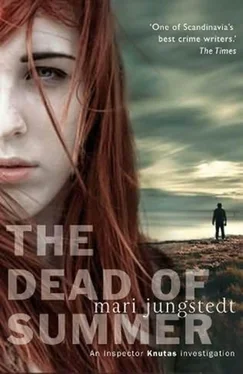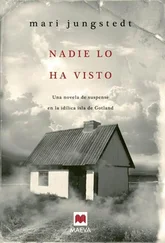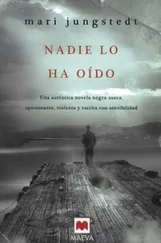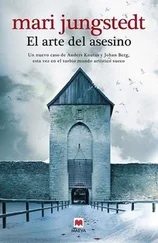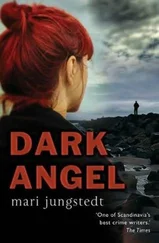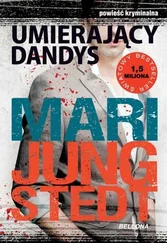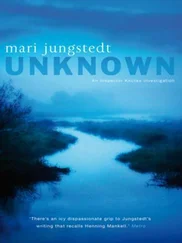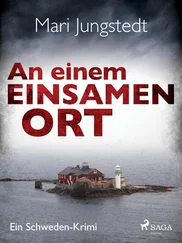As usual, the tourism director took it for granted that whoever she happened to be calling had all the time in the world to talk to her. She didn’t ask whether she might be interrupting anything, even though the police were in the middle of a homicide investigation. Jacobsson did her best not to sound too annoyed.
‘Is that right?’
‘Yes. It had already started yesterday morning, and since then it has escalated, getting worse and worse. And now the cancellations have started rolling in too. What if people decide they don’t dare come over here? What if the murderer strikes again, at some other tourist destination?’
The high season was not very long on Gotland; it lasted about six weeks, from Midsummer’s Eve until early August. During that time, between 300,000 and 400,000 tourists visited the island, which had only about 60,000 permanent residents. So of course the income from these tourists was essential. Jacobsson could understand why Sonja Hedström was so concerned.
‘Tell the people who call that there’s no indication that the murder has anything to do with camping or that particular campsite,’ said Jacobsson. ‘On the other hand, we really can’t rule out anything, since we’ve just started the investigation.’
‘The only thing that will calm the public down is if the police catch the murderer. How close are you to making an arrest?’
‘Impossible to say at this point. The murder was committed only yesterday, you know.’
‘And you really have no idea what this is all about? There must be some sort of clues at the crime scene, and I’m sure that lots of people must have noticed something. I mean, he was shot, after all, and the shots must have been heard in a wide area, and Sudersand was fully booked. Now lots of campers have decided to cut short their holidays and leave. Nobody is going to want to camp there after this. Do you realize what a disaster this is for the owner of the campsite?’
Great. Now it seemed Sonja Hedström also wanted to tell the police how to run a murder investigation.
‘At the moment my primary sympathies are not with the owner of the campsite,’ said Jacobsson dryly. ‘And of course there are witnesses and evidence. That’s exactly what I need to concentrate on right now instead of wasting time on unnecessary phone conversations.’
‘You don’t need to be so rude,’ said Sonja Hedström, clearly insulted. ‘Peter Bovide was a frequent visitor to the campsite, so it’s not so strange that rumours have been spreading; they say the murderer must hate people with caravans, or something like that. I just wanted to know what I can tell people to reassure them, at least a little bit, but I guess I’ll just have to wait until Anders gets back.’
The tourism director’s voice was quivering with indignation, and with an abrupt click she hung up.
The blood instantly raced through Jacobsson’s body, and with a flushed face she went out into the hall to get some water. That usually helped if she was feeling upset.
As she was drinking from her plastic cup, Thomas Wittberg showed up in the hall. As usual, he was more suntanned than anyone else; he wore a white T-shirt to show off his tan, and a pair of worn jeans. His curly blond hair was longer than normal and hung down into his eyes, which were barely visible.
‘Hi, how’s it going? You’re looking like a thundercloud.’
‘Don’t ask,’ Jacobsson said between clenched teeth. She turned her back to him as she filled another cup with water from the drinking fountain.
‘That bad, huh? Well, I’ve got some news. Would that help?’
A couple of minutes later they were seated in Jacobsson’s office. Wittberg had dropped on to the chair facing her desk.
‘I just talked to the man who was captain of the Fårö ferry yesterday morning. He told me that on the first crossing at four a.m. there were only three cars on board. He always finds it amusing to study the passengers on the ferry, so that’s why he remembers exactly who was sitting in those three cars. If the perp wasn’t already on Fårö, then he would have had to take the four o’clock ferry across the sound. There aren’t any earlier boats, and the one at five o’clock would have been too late.’
‘And?’
‘In the first car there was a young couple who looked as if they’d been partying in Visby all night. The driver of the second car was a pregnant woman, and in the third was a man with a horse trailer hitched to his car.
‘Does the captain remember what kind of cars they were driving?’
‘That’s what’s so amazing. He not only remembers the colour and type of car, he can even tell us the licence plate numbers. He usually memorizes at least the letters.’
‘What a guy! He should be a detective,’ said Jacobsson with a laugh, forgetting her earlier annoyance. ‘What’s his name?’
‘Bo Karlström. Sixty years old. From Fårösund.’
‘Good. Get him in here ASAP. He might have actually seen the perp. And get started on looking for those people in the cars. We need to find out why they were going out to Fårö so early in the morning.’
WHEN EMMA WINARVE drove into the car park near the Almedal library, part of her wanted to turn round and go straight back home. She cast a glance at her face in the mirror. She could see how pale she was under the sunburn, and there were bags under her eyes. Never mind. She was just going to leave Elin with Johan for a little while so she could go to the dentist. Nothing to get excited about.
She got out and opened the boot of the car. With some effort, she hauled out the pushchair and unfolded it. On the rack underneath she put Elin’s bag, containing nappies, a baby bottle filled with water and a stuffed animal. Then she lifted her daughter out of the car and kissed her neck before she put her in the chair and stuck a dummy in her mouth. She straightened the child’s cotton dress and patted her hair, which was pulled back in a ponytail. It had grown long and now reached all the way down her back. They headed toward Almedalen. The lovely park was right outside the Visby ring wall, an oasis between the town and the harbour.
The sun was blazing, and it was already hot. The park was relatively deserted this early in the morning. An elderly woman was sitting on a bench, tossing breadcrumbs to the ducks in the pond, and a couple of early-rising mothers and their toddlers had settled on blankets which they’d spread out on the grass. Otherwise Emma saw mostly tourists who were on their way to the boats in the harbour, or to their cars, carrying all their beach paraphernalia as they headed for the sea.
Everything seemed so carefree in the summertime. The people she passed all seemed happy and relaxed as they chatted and laughed. It made her feel even more lonely and miserable. Was life so much easier for everyone else? Was there something wrong with her, something that somehow made her life more difficult?
They had agreed to meet outside the Packhus restaurant on Strandgatan, but as she approached the ring wall she had already caught sight of Johan as he came through the gate opening. He was looking the other way and hadn’t yet seen her. She couldn’t help it if she still found him attractive. His dark hair, those sinewy arms, his unshaven cheeks. He was wearing shorts, which revealed that his long legs were slightly bowed, and of course the obligatory trainers. Johan had never been interested in fashion.
For a few moments she pretended that nothing had changed between them, that they were simply about to meet and take a walk in the park with their daughter. That everything was fine.
She had just managed to convince herself how that would feel when he turned his head and saw her. She flushed when she noticed how his face lit up.
He waved and started towards her.
Читать дальше
